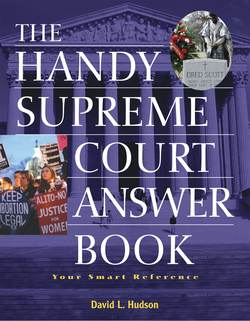Читать книгу The Handy Supreme Court Answer Book - David L Hudson - Страница 220
На сайте Литреса книга снята с продажи.
The Supreme Court upheld the National Bank in what famous case?
ОглавлениеThe Marshall Court unanimously ruled in McCullough v. Maryland (1819) that Congress had the power to create a national bank and that the state of Maryland could not tax a branch of the National Bank located in Maryland. The state of Maryland levied a tax on all banks not chartered by the state. This tax applied only to the National Bank. James McCullough, the National Bank’s cashier, refused to pay the state tax, leading to the lawsuit.
CourtSpeak: Dartmouth College v. Woodward Contract Clause Case (1819)
Chief Justice John Marshall (thoughts on a corporation): “A corporation is an artificial being, invisible, intangible, and existing only in contemplation of law. Being the mere creature of law, it possesses only those properties which the charter of its creation confers upon it, either expressly, or as incidental to its very existence. These are such as are supposed best calculated to effect the object for which it was created. Among the most important are immortality, and, if the expression may be allowed, individuality; properties, by which a perpetual succession of many persons are considered as the same, and may act as a single individual. They enable a corporation to manage its own affairs, and to hold property, without the perplexing intricacies, the hazardous and endless necessity, of perpetual conveyances for the purpose of transmitting it from hand to hand. It is chiefly for the purpose of clothing bodies of men, in succession, with these qualities and capacities, that corporations were invented, and are in use. By these means, a perpetual succession of individuals are capable of acting for the promotion of the particular object, like one immortal being. But this being does not share in the civil government of the country, unless that be the purpose for which it was created. Its immortality no more confers on it political power, or a political character, than immortality would confer such power or character on a natural person. It is no more a state instrument, than a natural person exercising the same powers would be.”
